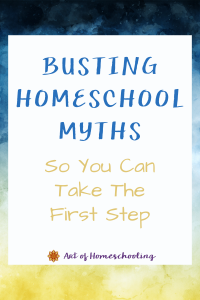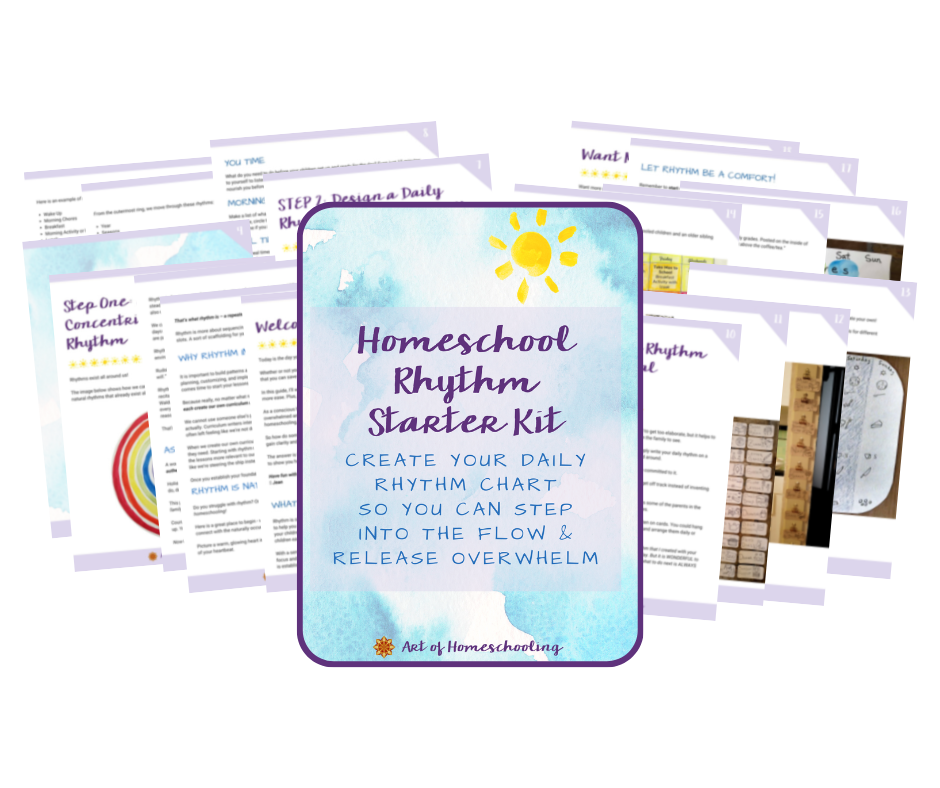The other day I was talking to a mom who shared, “I’m considering homeschooling next year.”
This isn’t the first time she’s considered this path for her family.
The last time she thought about homeschooling her two kids, she did hours and hours of research. She wanted to “practice homeschooling” during the summer…
But it didn’t go over very well.
Her son resisted the lessons and wanted to play instead. Her confidence started to wane and this lovely mom began to doubt that she could really be a homeschooling mom.
She thought she just needed to find the “best” workbooks and curriculum for her kids.
However, what we discovered through our conversation was that her son was a hands-on learner. Workbooks and desk work were not the right fit for him.
Sometimes what we think homeschooling is… isn’t it at all!
There are a lot of misconceptions about what homeschooling is and isn’t, how it works, what works, and how to make it sustainable and enjoyable.
When my husband and I were first considering it, homeschooling seemed so huge and daunting. And that was over 25 years ago… So I get it – there’s a lot to consider.
Yet, when you break it all down and handle each consideration one at a time, you can begin to develop a fully informed decision. From that place of deeper understanding, you can (and will!) move forward with confidence, no matter what you choose.
Envision what your homeschool will look like.
Homeschooling is less about what you teach and which curriculum you buy, and more about engaging with your children and being willing to be flexible.
Learning is dynamic, flowing, and sometimes outright messy.
And when your children learn at home (which they are already doing, in case you didn’t know, because children are learning all the time…) it’s such a wonderful opportunity to strengthen your family bonds.
You get to watch curiosity flourish, or be re-kindled. You get to take part in cultivating a lifelong love for learning.
Homeschooling is way more than checklists, benchmarks, and the right curriculum… It’s different from school-school. And it’s not about being a perfect parent either…
So let’s see if we can bust some myths about homeschooling so that you may take the first step with courage and confidence.❤
Myth #1: Homeschooling Means Recreating the Classroom at Home.
Actually – no, it doesn’t! And this is really good news.
Homeschooling won’t look like what happens in a brick and mortar school. It can’t.
Instead, this is an opportunity to expand your view of what teaching and learning are. Children (all of us, really) are learning all the time… not just in a classroom, not just during lessons.
And, all that time that our children spend away from us when they go to school – we get to take that back. (What a relief to not have to be out the door on time every morning, right?!)
Homeschoolers get to slow down and embrace simplicity in their days.
If you homeschool, you get to do something unique and customized and adventurous and connecting. There is quite a bit of freedom afforded to homeschoolers and I encourage you to toss out the idea that you need to pretend your home is a classroom!
Embrace what you have, who you are as a parent, and who your children are as individuals.
Myth #2: Homeschooling is a Full-Time Job OR Myth #3: Homeschooling Means I Get to Just Chill at Home.
Neither extreme is true!
Homeschooling doesn’t have to be a full-time job. But it does require a good deal of energy on our part as the parent. We learn to observe our children and bring them enriching learning activities that are engaging.
Homeschooling parents are facilitators of learning, so it helps to have a simple plan that’s customized to your family. It’s not realistic to think you can just purchase a one-size-fits-all curriculum and you’re good to go…
So while we want to set up healthy fun learning moments for our children, neither do we want to overwork as homeschool parents nor do we want to neglect the holistic needs of our children.
There’s a healthy balance to achieve!
Keeping our daily routines and the lessons simple and doable is key. And then, in that simplicity, teachable moments can organically arise. Inviting activities such as reading together, practicing drawing with sidewalk chalk outside, telling stories with puppets or dolls, watercolor painting, and molding clay will bring the learning to life.
Homeschooling requires us to be present and prepared, but also flexible and intuitive. It is a balancing act. And when the balance is optimal, our lessons will be memorable, spark interest, bring joy, and flow with ease.
Myth #4: Being a Homeschool Parent Means I Should Always Be Ready for Each Lesson Every Day, Like Classroom Teachers.
Know that you’ll have days when you feel overwhelmed and unprepared. And that’s OK.
Homeschoolers have good days and bad days just like teachers in a classroom. We’ll learn as we go and so will our children!
And one of the beautiful benefits is that we get to be present to watch our child’s learning unfold.
A second benefit is flexibility with the schedule. Struggling on a Wednesday morning with the dirty laundry, a tantruming child, and a sniffly nose? You can always adjust your lesson plan one day and everything will be fine. Or, build in more field trips and days off as needed.
You would be amazed at how much unexpected learning happens without you even doing anything! Like, you and your kids could be driving down the road and all of a sudden your first grader reads a word on a sign you drive by.
Ultimately, homeschooling is not about you suddenly becoming a superhuman. Take it one step at a time and enjoy the journey.
Myth #5: Homeschool Kids Don’t Get Their Socialization Needs Met.
Every homeschooling family I know has too many opportunities for socialization! As homeschoolers, we actually have to learn to say no sometimes.
Through all of our years as a homeschooling family, my experience has been that folks who are unfamiliar with homeschooling think socialization is going to be the biggest challenge. When in fact, it’s quite the opposite.
Children enjoy playing and learning with other children. But we don’t need to make this happen every single day. And there are just so many encounters with other children and family and friends regularly.
The truth is that most homeschooling children have a healthier socialization experience than those children who spend their days in school with same-age peers. What does this look like? Playgroups, homeschool co-ops, one or two or three other homeschooling families that you can gather with one day a week, classes at museums and other cultural institutions, hikes with friends, games days with grandparents, sleepovers with cousins… the possibilities are plenty.
So seek out the homeschooling groups or families in your area to discover what’s available. What social opportunities are in your area for playing with and getting together with friends?
Taking the First Step
Homeschooling is about having a plan, being present and prepared, and showing up with love, inspiration, and flexibility. You can do this – you can make it work if you choose to!
Dr. Martin Luther King Jr. said, “Take the first step in faith. You don’t have to see the whole staircase, just take the first step.”
What does taking the first step mean to you?
Want help creating a daily rhythm or routine to help your homeschooling go more smoothly? Here’s a free guide to Homeschool Rhythm Starter Kit. Get the guide here.




Thank you, Jean! I have always appreciated your calm, gentle approach. Thanks for sharing this – even though I’ve been at this awhile now, it was a very timely reminder. I’ve been feeling overwhelmed with planning for next year – while still trying to get through the summer and a pandemic.
Thanks, Kimberly! Homeschooling is hard enough…then add the pandemic on top of it, and we’re all a bit overwhelmed. Thanks for your comment. I’m honored to be able to help homeschooling parents in any way I can. May you have some super fun moments this summer!